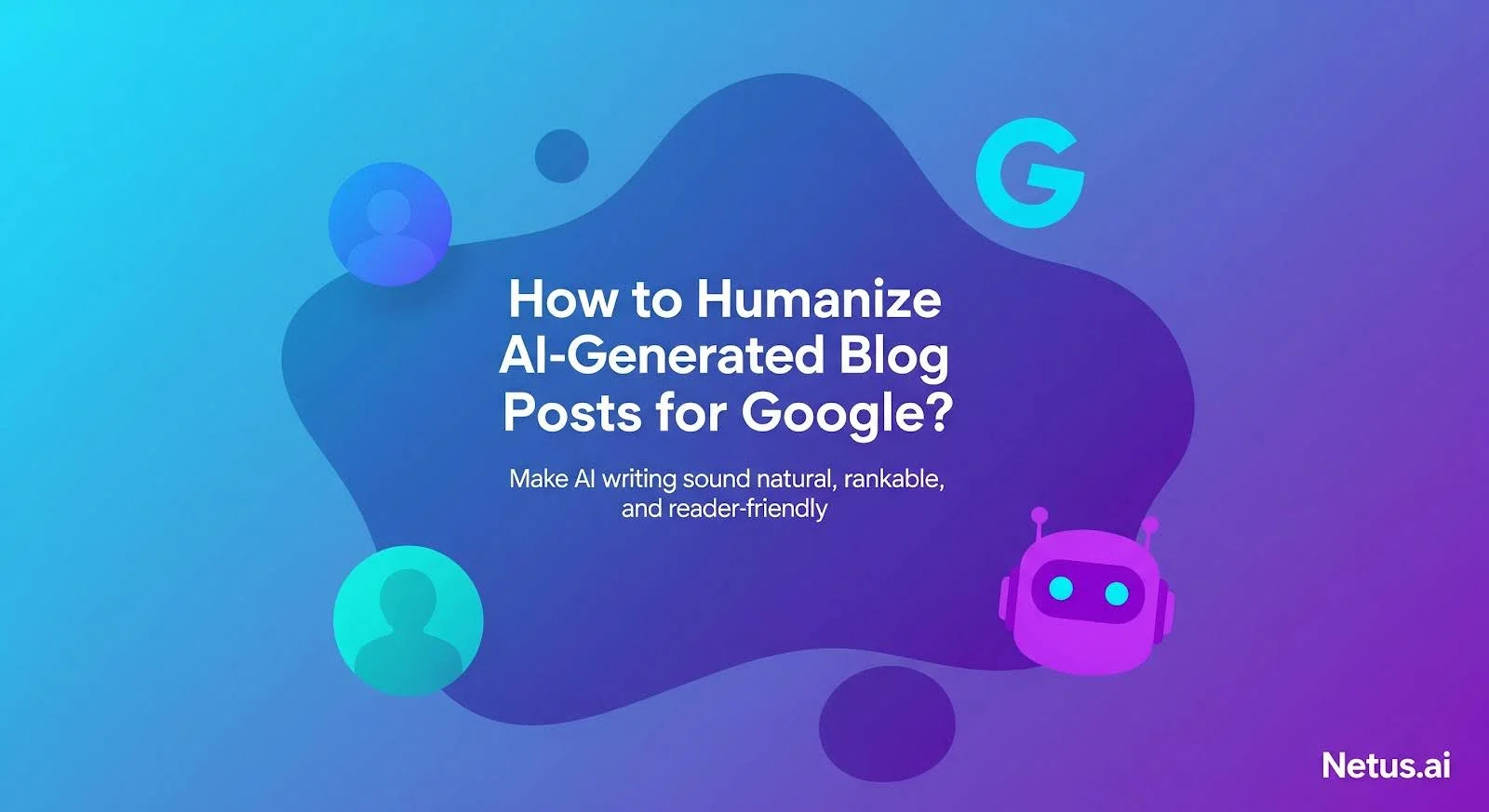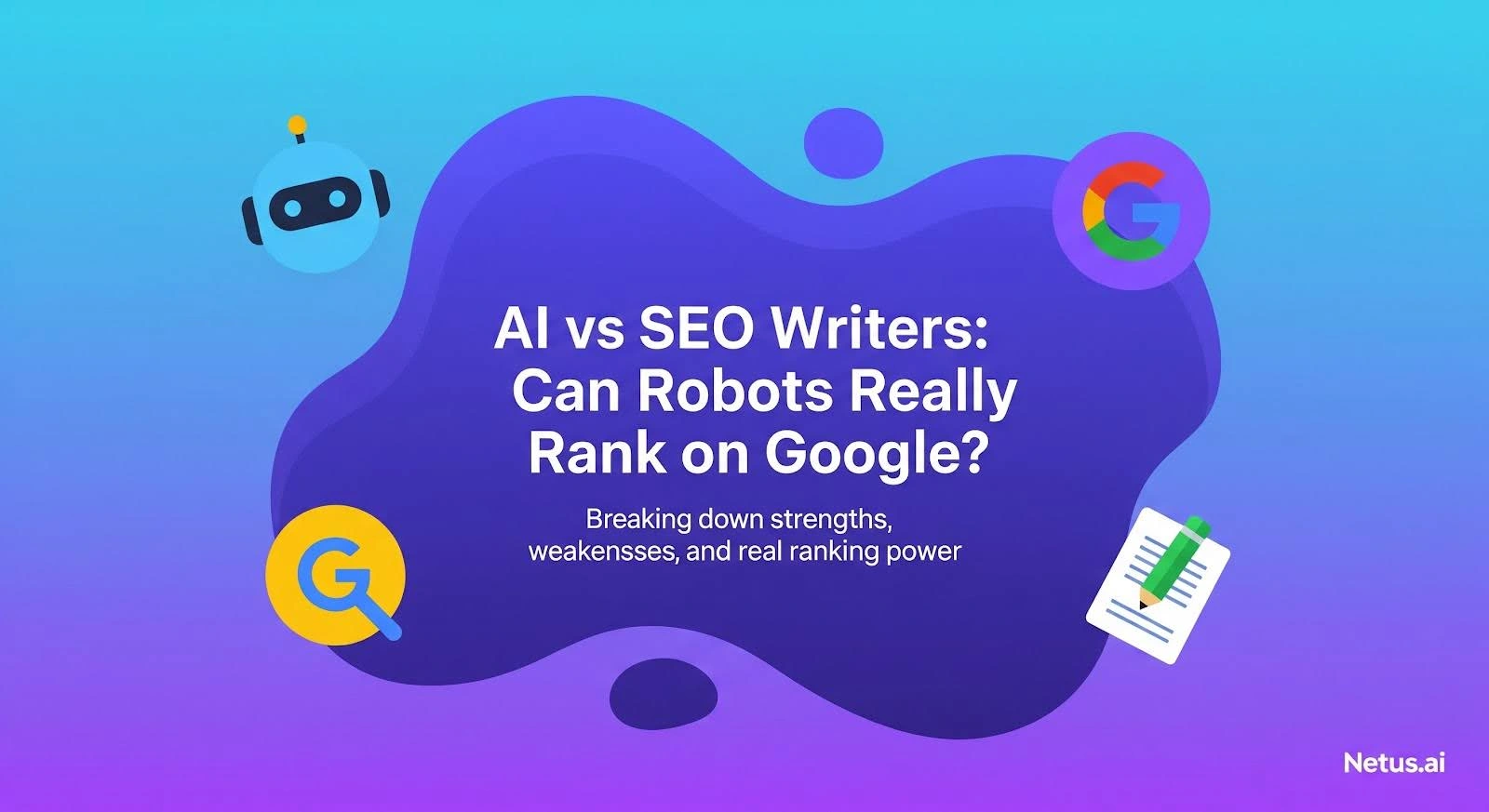Google prioritizes content quality above all else, not whether it’s AI or human-generated. “Good” content now means thoroughly satisfying a user’s query, making them not want to return to search results.
It’s not AI vs. humans but mediocre vs. exceptional content. The tool is secondary; understanding each’s strengths and flaws is key to success.
What Google is actually looking for? (hint: it’s not your word count)
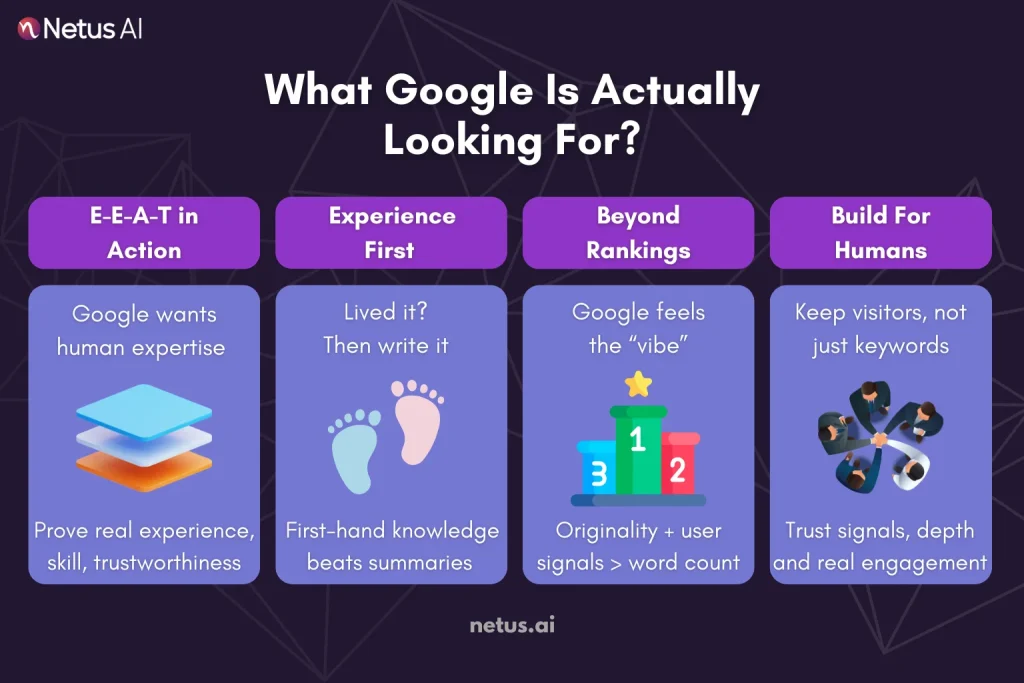
To succeed, understand Google’s rules. Google’s guidelines now prioritize helpful, trustworthy human content (E-E-A-T).
E-E-A-T: more than just a buzzword
E-E-A-T (Experience, Expertise, Authoritativeness, Trust) is Google’s framework for separating the wheat from the chaff. It’s the algorithm’s way of asking, “Should anyone actually listen to you?”
- Experience: Google prioritizes content based on real-world, first-hand experience. Proof of direct engagement, like having used a product you review or visited a city you describe, is crucial. This demonstrates authentic expertise, akin to a seasoned fisherman’s advice versus a book report.
- Expertise: For high-stakes YMYL topics (finance, health), author qualifications are crucial. A certified accountant’s tax law article, for instance, offers more expertise than one from a generalist AI.
- Authoritativeness: Build brand authority by consistently publishing expert content and earning backlinks and mentions, as Moz has long taught. Authority is earned, not given.
- Trust: Citing sources, clear author bios, transparent affiliate relationships and a secure website build reader trust.
AI content lacks genuine experience and can only synthesize expertise, failing to build trust or authority.
Beyond the acronym: the vibe check
Google also uses a host of other signals to get a “vibe check” on your content. These are often measured by how users interact with your page.
- Depth and originality: Does your article just repeat the same three points as every other post on the first page? Or does it offer a unique perspective, new data or a more comprehensive answer? Google rewards content that adds something new to the conversation.
- User engagement: User behavior, specifically dwell time versus “pogo-sticking,” indicates content quality to Google. High bounce rates signal content failure, irrespective of optimization.
The AI content generator: a powerful, flawed intern
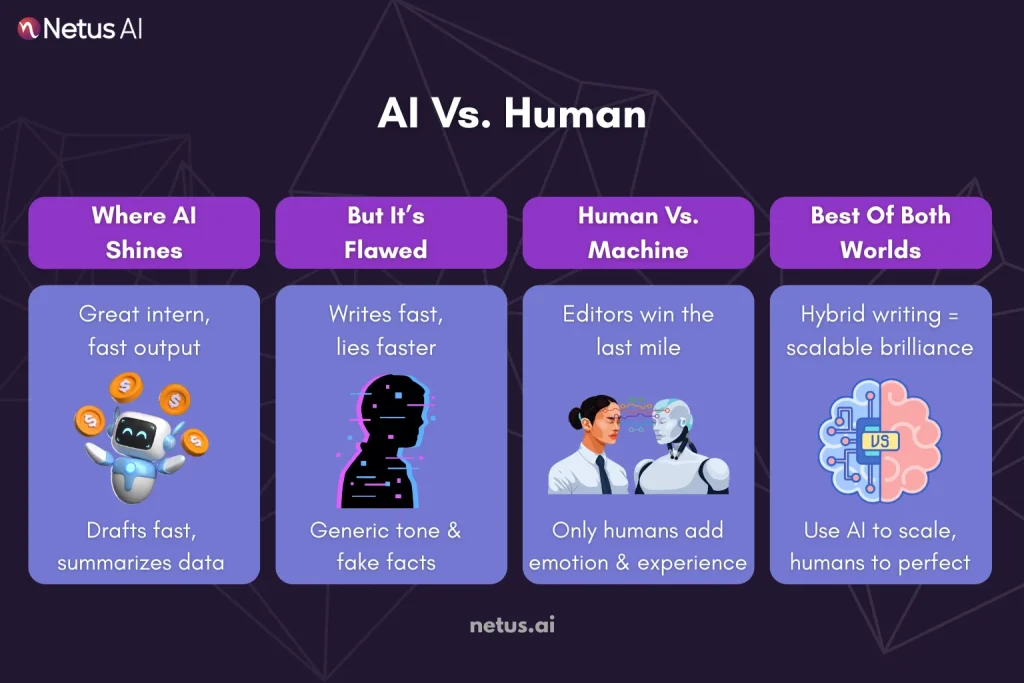
Let’s be clear: AI writing tools are incredible. AI tools are powerful, fast interns, producing much work but lack real-world experience and tend to fabricate.
Where AI shines: the heavy lifting
- Breaking the blank page: AI is fantastic for beating writer’s block. It can generate outlines, brainstorm subtopics and create a “skeleton” for an article in seconds.
- Summarizing research: You can feed AI long, dense reports or studies and ask for the key takeaways, saving hours of reading time.
- First drafts at lightning speed: An AI can produce a 2,000-word first draft in the time it takes to make a cup of coffee. This raw material, while flawed, can be a huge time-saver for a human editor.
The fatal flaws of raw AI output
- The soul of a robot: ai content has a tell-tale generic quality. It lacks a unique voice, personality or any sense of style. It’s grammatically correct but emotionally vacant.
- Confident untruths: AI models will “hallucinate,” or invent facts, with absolute confidence. They will create statistics, cite non-existent studies and misattribute quotes. publishing this without rigorous fact-checking is brand suicide.
- Repetitive and predictable: AI’s repetitive language is a red flag for readers and algorithms.
The human writer: the master of the last mile

Human writers, as seasoned professionals, add the crucial final 10% that generates 90% of the value, unlike AI.
The human’s unbeatable edge
- Authentic storytelling: Humans excel at storytelling, sharing experiences and connecting with readers through humor and empathy, fostering loyalty.
- Genuine insight: Human experts offer original, contrarian or new perspectives, unlike AI, which only synthesizes existing information.
- Strategic nuance: a skilled writer understands the audience’s emotional triggers and pain points. They know how to craft a message that not only informs but also persuades and converts.
- The “experience” factor: Humans’ trump card is authenticity. AI cannot replicate real stories, client successes, personal failures or hands-on reviews.
The practical limitations
Of course, human writers aren’t perfect. This slow, costly process, where maintaining a consistent voice across a large team is challenging, necessitates a hybrid approach.
The hybrid workflow: the only strategy that works
The debate isn’t “AI vs. Human.” It’s “AI + Human.” The most efficient and effective content teams are building a workflow that leverages the best of both.
Here’s what that looks like in practice:
- Human-led strategy: A human strategist defines business goals, target audience and performs keyword and competitor analysis. They then create a detailed content brief outlining structure, unique angle and E-E-A-T elements.
- AI as the intern: The detailed brief is fed to an AI to generate the first draft. This handles the initial heavy lifting and creates the raw material.
- The human editor: Human writers produce fresh, polished, unique, fact-checked, experienced and captivating content.
- Final human polish: A final human proofread catches errors and readies the piece for publication.
This isn’t about bypassing a detector. Excellent, helpful, trustworthy content, regardless of its origin, is what Google and readers seek.
Content starts at generation: NetusAI’s SEO article writer and content generator
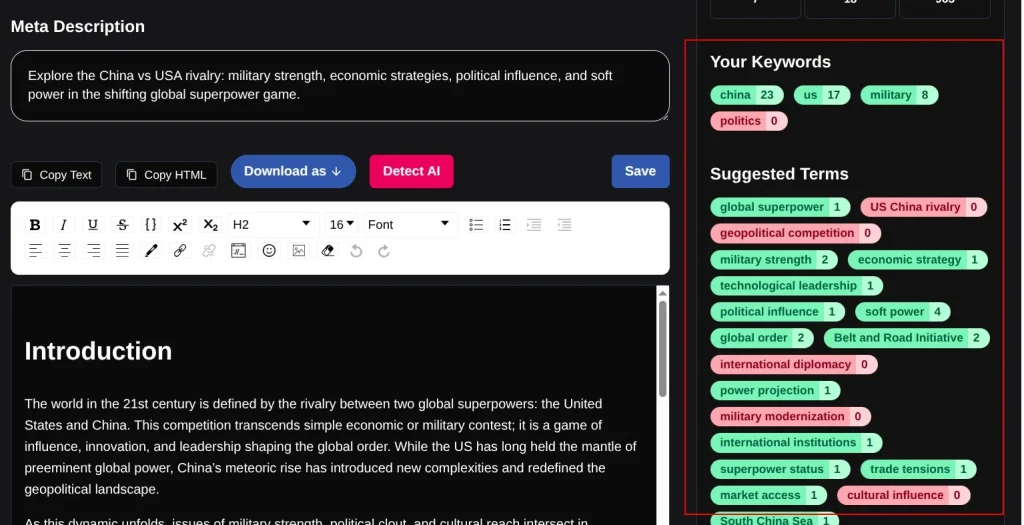
Avoiding stylometry and detection issues shouldn’t begin after content is written, it should start with the writing itself. That’s where NetusAI steps in.
The NetusAI SEO article generator creates SEO-optimized blog posts, unlike generic AI tools producing easily flagged content. Unlike generic tools, it goes beyond simple drafting. It:
- Lets you input headlines and targeted SEO keywords
- Supports long-form templates for full blogs
- Auto-generates a structure with Title → Outline → Content
- Works in multiple languages for global teams
It connects directly to the Netus AI Bypasser + Detector system, ensuring your output is readable and avoids detection.
Unified platform for marketers, freelancers and bloggers to generate, review and rewrite AI content that sounds human.
Content Generator
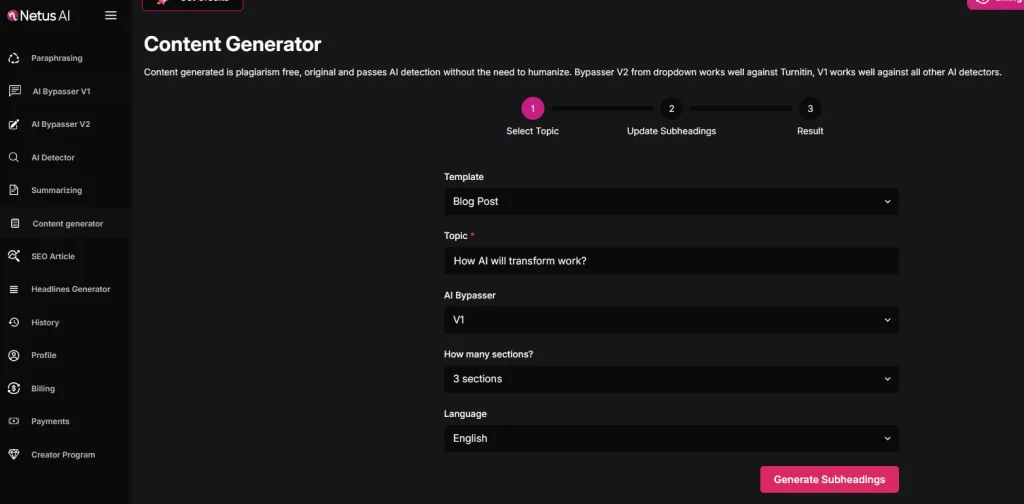
NetusAI offers a content generator that produces plagiarism-free content. Users can generate, download, copy and view their content history on the user-friendly NetusAI page.
NetusAI efficiently rewrites and generates high-quality, SEO-optimized articles from scratch or existing ideas, saving time without compromising trust.
Final Thoughts
Google doesn’t care who wrote your content, it cares how helpful it is. The old formula of mass-generating keyword-stuffed AI blogs is long dead. If your content reads like a robot wrote it, it won’t rank, even if the facts are correct.
That’s why the smart play is hybrid creation, with NetusAI, you can:
- Write with structure using the SEO article generator
- Plagiarism free content generator
- Detect and fix red flags with the AI bypasser
Or you can start with AI, humanize with Netus AI, then finalize with human judgment. This approach gives you the speed of automation and the trustworthiness Google demands.
FAQs
1. Does Google penalize AI-generated content?
No but it demotes unhelpful, low-quality content. If your AI content is repetitive, thin or lacks human nuance, it won’t perform well in search.
2. Can AI-generated blog posts rank on Google?
Yes, if they’re helpful, clear and original. The key is to rewrite them into human-sounding drafts using tools like Netus AI.
3. How do AI detectors work in Google’s algorithm?
Google uses internal signals to detect patterns like predictability, low engagement and lack of E-E-A-T.
4. What’s the benefit of using Netus AI over raw AI generators?
Netus AI rewrites your AI content for undetectability, adjusting tone, structure and clarity for ranking.
5. Should I use AI for everything or combine it with human editing?
Use AI to speed up workflows but always pair it with detection-safe rewrites (via Netus AI) and final human edits for best results.
6. Will human-written blogs always rank better than AI ones?
Not always. If AI-generated posts are rewritten smartly and optimized well, they can outrank sloppy or low-value human drafts.

